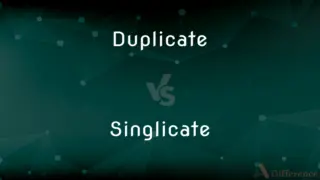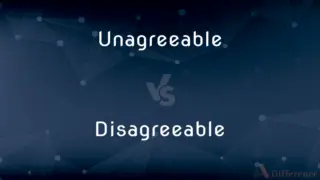Repellant vs. Repellent — Which is Correct Spelling?
Edited by Tayyaba Rehman — By Fiza Rafique — Updated on March 19, 2024
Repellant is the incorrect spelling. Repellent is the correct spelling and refers to a substance that deters or keeps away.

Table of Contents
Which is correct: Repellant or Repellent
How to spell Repellent?

Repellant
Incorrect Spelling

Repellent
Correct Spelling
ADVERTISEMENT
Key Differences
The phrase “Lent a repellent” can remind you of the double L and the "ent" ending.
Recall that "repel" has one "l," so when adding "-ent," it gains a second.
Think of repellent as something that “tells” bugs to go away. Both "tell" and "repellent" have double L's.
"Ant" bites but a "repellent" keeps them away. Remember the "ent" ending.
The word "ell" (as in L-shape) has two L's, which can be seen in "repellent."
ADVERTISEMENT
How Do You Spell Repellent Correctly?
Incorrect: This fabric is treated with a water repellant.
Correct: This fabric is treated with a water repellent.
Incorrect: You'll need a strong snake repellant in the jungle.
Correct: You'll need a strong snake repellent in the jungle.
Incorrect: The mosquito repellant was ineffective against the bugs.
Correct: The mosquito repellent was ineffective against the bugs.
Incorrect: They sell a natural insect repellant in the store.
Correct: They sell a natural insect repellent in the store.
Incorrect: The smell was so repellant, we had to leave the room.
Correct: The smell was so repellent, we had to leave the room.
Repellent Definitions
Repellent is a substance that deters insects or other pests.
She sprayed a mosquito repellent before going camping.
Repellent can signify an opposing force.
The two magnets had a repellent effect when brought close together.
Repellent can refer to a treatment or method that prevents something from soaking into a material.
The jacket had a water repellent finish.
Inspiring aversion or distaste; repulsive.
Resistant or impervious to a substance. Often used in combination
A water-repellent fabric.
Serving or tending to repel something, especially insects
A repellent spray.
A substance used to repel insects.
A substance or treatment for making a fabric or surface impervious or resistant to something else.
Tending or able to repel; driving back.
Repulsive, inspiring aversion.
Resistant or impervious to something.
Someone who repels.
A substance used to repel insects, other pests, or dangerous animals.
A substance or treatment for a fabric etc to make it impervious to something.
Driving back; able or tending to repel.
That which repels.
A remedy to repel from a tumefied part the fluids which render it tumid.
A kind of waterproof cloth.
A compound with which fabrics are treated to repel water
A chemical substance that repels animals
The power to repel;
She knew many repellents to his advances
Serving or tending to repel;
He became rebarbative and prickly and spiteful
I find his obsequiousness repellent
Highly offensive; arousing aversion or disgust;
A disgusting smell
Distasteful language
A loathsome disease
The idea of eating meat is repellent to me
Revolting food
A wicked stench
Incapable of absorbing or mixing with;
A water-repellent fabric
Plastic highly resistant to steam and water
Repellent describes something causing disgust or aversion.
His behavior was repellent to those around him.
Repellent denotes something that resists or keeps away.
The town erected a repellent barrier against floods.
Repellent Meaning in a Sentence
Waterproof repellent is essential for camping gear.
She applied insect repellent before going hiking.
The plant's natural repellent properties keep insects at bay.
This repellent is safe for children and pets.
The repellent works by masking the scents that attract pests.
The repellent spray keeps mosquitoes away for hours.
They developed a new, environmentally friendly pest repellent.
The repellent effect of the spray lasts all day.
They're selling an organic repellent for garden pests.
The company claims their repellent is effective against all kinds of insects.
The repellent coating on the tent keeps the interior dry.
The repellent has a pleasant smell, unlike most products.
Applying repellent correctly is important for it to be effective.
Wearing repellent is the best way to avoid bug bites.
Many travelers forget to pack repellent on tropical vacations.
Repellent candles are a great addition to outdoor gatherings.
The repellent should be reapplied after swimming.
This sunscreen is combined with insect repellent for dual protection.
The effectiveness of a repellent can vary depending on the active ingredient.
Using repellent is a key part of preventing mosquito-borne diseases.
Planting repellent herbs in the garden can help deter pests naturally.
She prefers repellent bracelets to sprays and lotions.
Make sure the repellent is DEET-free if you're using it on young children.
Common Curiosities
Why is it called Repellent?
It is called repellent because it repels or keeps away unwanted things.
What is the root word of Repellent?
The root word is "repel."
Which vowel is used before Repellent?
The vowel "e" is used before repellent.
Which preposition is used with Repellent?
The preposition "with" is often used with repellent (as in "sprayed with repellent").
What is the pronunciation of Repellent?
It is pronounced as /rɪˈpɛl.ənt/.
Which conjunction is used with Repellent?
Any conjunction can be used with repellent depending on the sentence context, such as "and" or "but."
Is Repellent a noun or adjective?
Repellent can be both a noun and an adjective depending on its usage.
Which article is used with Repellent?
Both definite ("the") and indefinite ("a" or "an") articles can be used with repellent depending on the context.
Is Repellent an adverb?
No, repellent is not an adverb.
What is the verb form of Repellent?
The verb form is "repel."
What is the singular form of Repellent?
The singular form is "repellent."
Is Repellent an abstract noun?
No, it's a concrete noun when referring to a substance and an adjective when describing something's nature.
Is the word Repellent imperative?
No, repellent is not imperative.
Is Repellent a vowel or consonant?
Repellent is a word, not a single letter. It contains both vowels and consonants.
What is the first form of Repellent?
The first form (verb form) is "repel."
What is the plural form of Repellent?
The plural form is "repellents."
Is Repellent a negative or positive word?
Generally, it has a negative connotation, but it can be positive when referring to protection against pests.
Is the word “Repellent” a Direct object or an Indirect object?
It can be either depending on the sentence structure.
How do we divide Repellent into syllables?
It divides as re-pel-lent.
What part of speech is Repellent?
Repellent can be both a noun and an adjective.
What is another term for Repellent?
Deterrent.
Which determiner is used with Repellent?
Any determiner like "this," "that," "my," or "a" can be used, depending on the context.
How many syllables are in Repellent?
There are three syllables in repellent.
What is the opposite of Repellent?
Attractive or enticing.
What is the third form of Repellent?
The third form (past participle) of the verb "repel" is "repelled."
Is Repellent a countable noun?
Yes, you can have one repellent or multiple repellents.
Is Repellent a collective noun?
No, it's not a collective noun.
Is the Repellent term a metaphor?
Not inherently, but it can be used metaphorically in some contexts.
What is the second form of Repellent?
The second form (past tense) of the verb "repel" is "repelled."
How is Repellent used in a sentence?
"She always carried insect repellent when hiking in the woods."
Is the word Repellent a gerund?
No, it's not a gerund.
What is the stressed syllable in Repellent?
The second syllable, "pel," is stressed.
Share Your Discovery

Previous Comparison
Duplicate vs. Singlicate
Next Comparison
Unagreeable vs. DisagreeableAuthor Spotlight
Written by
Fiza RafiqueFiza Rafique is a skilled content writer at AskDifference.com, where she meticulously refines and enhances written pieces. Drawing from her vast editorial expertise, Fiza ensures clarity, accuracy, and precision in every article. Passionate about language, she continually seeks to elevate the quality of content for readers worldwide.
Edited by
Tayyaba RehmanTayyaba Rehman is a distinguished writer, currently serving as a primary contributor to askdifference.com. As a researcher in semantics and etymology, Tayyaba's passion for the complexity of languages and their distinctions has found a perfect home on the platform. Tayyaba delves into the intricacies of language, distinguishing between commonly confused words and phrases, thereby providing clarity for readers worldwide.


































